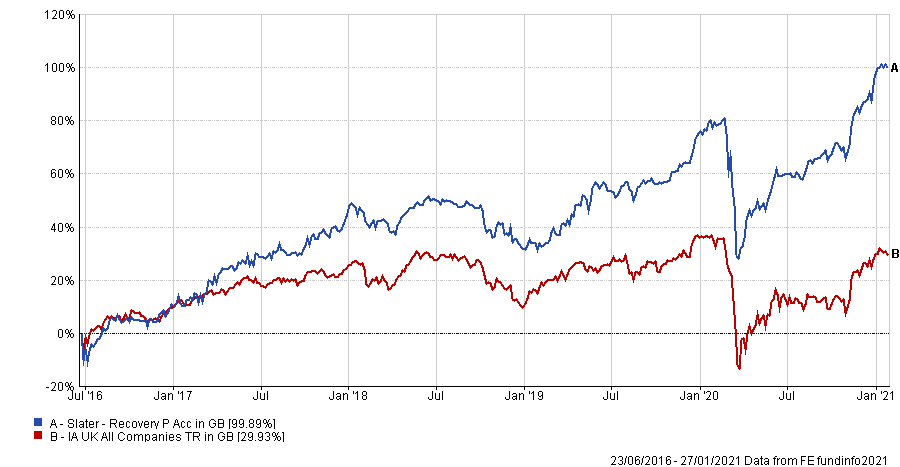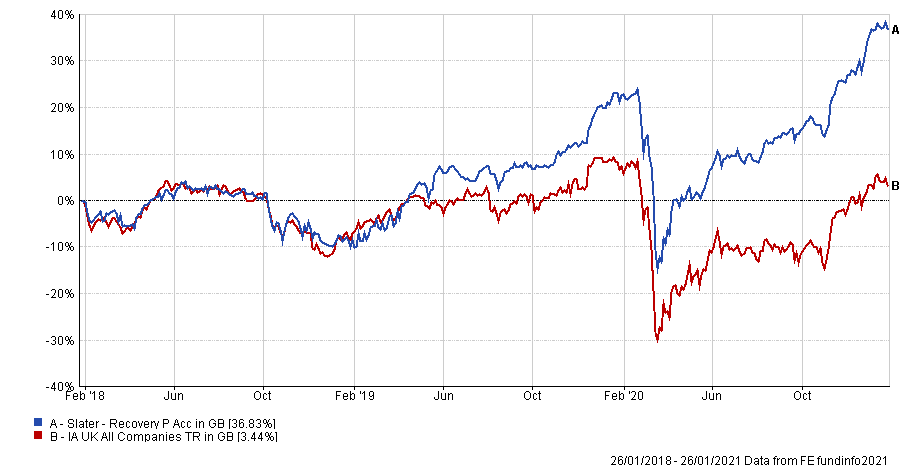The UK’s protracted exit from the EU created a difficult investment landscape for UK managers over the last four-and-a-half years, which has only been compounded by political uncertainty and Covid-19.
Mark Slater (pictured) – manager of the £147.9m, five-FE fundinfo Crown-rated Slater Recovery fund – said that Brexit-based uncertainty and a fragile political environment led to investors avoiding the UK. 
He said: “Between 2016 and until very recently, the UK has probably been the most unpopular stock market in the world, possibly the most unpopular it’s been in my lifetime.”
However, he said there were other headwinds that caused the UK’s stock to fall further, such as the 2017 general election called by then Conservative prime minister Theresa May. The result led to a hung parliament, with a more left-wing Labour party becoming more prominent.
“The general election in June 2017 meant [Labour party leader Jeremy] Corbyn became a factor in peoples’ minds, that massively accelerated outflows,” said Slater.
He explained that for most international investors the UK became un-investable and it was a similar story for domestic investors too.
However, with a trade deal now signed, a majority Conservative government in power and the UK leading the way in vaccine rollout programmes, it is once again looking like an attractive landscape for investment.
“It’s only very recently that the mood has shifted,” said Slater. “The risk of a Marxist government has gone and now there’s a resolution on Brexit.
“It was like someone ringing a bell. Those two things which terrified people and caused massive outflows in the UK equity market have been resolved and people are beginning to come back.”
Despite the changing sentiment around the UK as an investment opportunity, the fundamentals of British business remained resolute, said Slater.
“These businesses operate irrespective of what government is in power,” he said. “Similarly, with Brexit there was a brief period were companies scrambled about to get themselves ready, but once they had, it was done.”
As his portfolio lacks the kind of industrial holdings that were hit by supply chain issues, the Slater Recovery fund was relatively unaffected.
“Not many of our businesses were affected but it certainly affected the mood, and the degree to which companies were ready to invest,” he explained.
Slater said the main impact was on price – which has subsequently left UK valuations relatively attractive to foreign investment and is demonstrated by the level of M&A activity.
“In spite of the twin concerns of Brexit and Corbyn, in 2019 we had seven takeovers,” said Slater. “Our strategy doesn’t seek out companies in takeover situations and in 26-odd years, we’ve had one or two per annum.
“Out of those seven in 2019 almost all were [by] overseas buyers and if not for Covid that would have continued quite aggressively into 2020.”
Indeed, since the Covid-19 vaccine news in November, the portfolio has had a further four takeovers, confirming foreign interest.
“One thing investors hate, in aggregate, is uncertainty,” said Slater. “A lot of US investors said Europe was too complicated and the UK was too complicated squared – but that’s changing.”
Since the referendum, growth-orientated and smaller companies strategies have been the predominant performers, with value funds continuing to struggle as they have for much of the past decade.
However, Slater’s fund – which blends growth and value – was one of three non-UK smaller companies strategies from across the Investment Association and investment trust universes that sat among the top-20 UK equity funds since the EU referendum.
Indeed, it made a total return of 99.89 per cent since the referendum, compared to a 29.93 per cent gain for the average fund in the IA UK All Companies sector.
Performance of fund vs sector since 23 June 2016

Source: FE Analytics
Slater, who seeks growth at an equitable price, is the son of renowned UK investor Jim Slater, who died in 2015 and coined the “Zulu Principle”, a strategy that combines growth, value, quality, and momentum factors.
Using price-to-earnings growth as a measure, the strategy compares a company’s forecast price-to-earnings ratio with its forecast earnings-per-share growth rate, which is currently deployed as a screening mechanism in the fund.
“We’re not interested in price-to-book,” said Slater, highlighting a three-pronged approach to screening stocks.
“We want companies that are growing at a double-digit rate in earnings terms,” he said. “Secondly, [we consider whether you] can you buy that growth cheaply, and the third is profit conversion into cash. Hence price-to-cash flow is important as we want the cash flow per share to be in excess of earnings per share.”
Slater explained those three screens eliminate 95 per cent of the UK market and would do something similar if applied to most markets.
“Most companies are not growing,” said the manager. “Or if they are, they’re very expensive or they’re not generating cash.”
A shortlist is collated which then requires further analysis into how reliable that growth rate is.
“Then the work goes from being entirely quantitative to entirely qualitative,” he said. “Is there a tangible tailwind which his driving that growth? It’s why our businesses are quite niche; they’re doing one or two things but are doing them exceptionally well.”
Nevertheless, as a bottom-up stockpicker, the macroeconomic environment in the UK is something Slater doesn’t heed too much attention to.
“Anything macro-related is incredibly difficult to get right and the last 12 months is a case in point,” he said. “It’s much easier to form a view on and have an informational advantage about a business.”
Performance of fund vs sector over 3yrs

Source: FE Analytics
Over three years, the Slater Recovery fund has made a total return of 36.83 per cent compared to 3.44 per cent for the IA UK All Companies sector peer. It has an ongoing charges figure (OCF) of 0.80 per cent.






